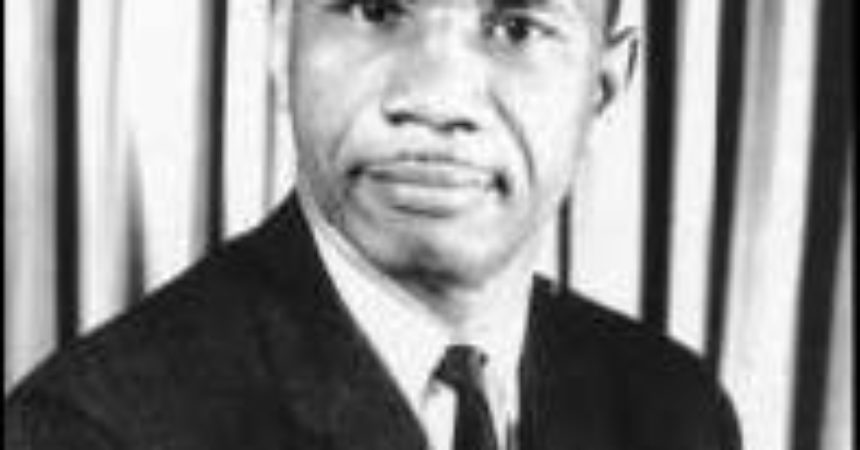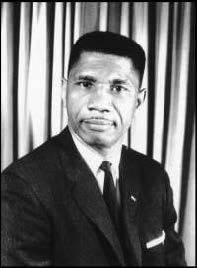
Trump attends opening of Civil Rights Museum despite his own racial insensitivities

Assassinated civil rights icon Medgar Evers, a field secretary with the NAACP, was a large focus of President Trump’s speech as his brother Charles Evers and widow Myrlie Evers sat in the audience at the open of the museum.
Photo special to the Outlook
By Hazel Trice Edney
Trice Edney News Wire
President Donald Trump was the lead person spreading the lie that President Barack Obama, America’s first Black president, was not born in the U. S.
President Trump also equated Ku Klux Klan members and Neo-Nazis to people protesting the evils of racism during the deadly White supremacist marches in Charlottesville, Va. last August.
Repeatedly, in front of the nation, he has flagrantly displayed racial insensitivities; even with his most recent support of Senate Candidate Roy Moore in Alabama, not only an accused pedophile, but a man who has said America was last great during slavery.
Since his inauguration, Trump and his appointee Attorney General Jeff Sessions have careful demolished important policies put in place during the Obama administration for the purpose of preventing police brutality and other issues of racial inequality in the criminal justice system.
In addition, President Trump has claimed massive voter fraud in America, a claim that experts say is patently false.
These are just a handful of the reasons that civil rights leaders opposed the president’s attendance at the Dec. 10 opening of the Mississippi Civil Rights Museum. They argue that the museum is like hallowed ground that celebrates those who risked their lives to fight against everything that Trump appears to embrace – despite his words to the contrary.
“President Trump’s presence at the opening of the Mississippi Civil Rights Museum is not a show of respect. It’s merely a photo op,” says Derrick Johnson, president/CEO of the NAACP. “I live in Mississippi and its civil rights leaders are my mentors, sheroes, and heroes. I cannot sit silently alongside a man who has used the power of his office to turn back the clock on hard-won rights.”
Johnson and civil rights leaders, Congressmen John Lewis (D-Ga.) and Bennie Thompson (D-Miss.), among others actually boycotted the official opening ceremony in order to call attention to Trump’s wrongs. Lewis and Thompson said they skipped the event after “careful consideration and conversations with church leaders, elected officials, civil rights activists,” and the citizens in their congressional districts.
“President Trump’s attendance and his hurtful policies are an insult to the people portrayed in this civil rights museum,” Lewis and Thompson said in a joint statement. “The struggles represented in this museum exemplify the truth of what really happened in Mississippi. President Trump’s disparaging comments about women, the disabled, immigrants, and National Football League players disrespect the efforts of Fannie Lou Hamer, Aaron Henry, Medgar Evers, Robert Clark, James Chaney, Andrew Goodman, Michael Schwerner, and countless others who have given their all for Mississippi to be a better place. After President Trump departs, we encourage all Mississippians and Americans to visit this historic civil rights museum.”
Still, Trump, at the invitation of Georgia’s Republican Gov. Nathan Deal, attended the opening. There, he appeared to only mouth a written speech expressing admiration and respect for those honored in the museum.
“The Civil Rights Museum records the oppression, cruelty and injustice inflicted on the African-American community, the fight to end slavery, to break down Jim Crow, to end segregation, to gain the right to vote, and to achieve the sacred birthright of equality here,” he said to applause. “And that’s big stuff. That’s big stuff. Those are very big phrases. Very big words.”
He continued, “Here, we memorialize the brave men and women who struggled to sacrifice, and sacrificed so much so that others might live in freedom. Among those we honor are the Christian pastors who started the Civil Rights movement in their own churches preaching, like Reverend Martin Luther King, Jr. – a man that we have studied and watched, and admired for my entire life – that we’re all made in the image of our Lord.”
Trump acknowledged NAACP former chair Myrlie Evers-Williams and Charles Evers in the audience as he especially focused on Medgar Evers, a civil rights worker and NAACP field secretary who was assassinated in his Jackson, Mississippi driveway on June 12, 1963.
“Martyrs like Sergeant Medgar Wiley Evers whose brother I just met at the plane,” he said, encouraging Charles Evers to stand. “Medgar joined the U.S. Army in 1943, when he was 17 years old. He fought in Normandy in the Second World War. And when he came back home to Mississippi, he kept fighting for the same rights and freedom that he had defended in the war. Mr. Evers became a civil rights leader in his community. He helped fellow African Americans register to vote, organize boycotts, and investigated grave injustices against very innocent people.
Trump continued, “For his courageous leadership in the Civil Rights movement, Mr. Evers was assassinated by a member of the KKK in the driveway of his own home. We are deeply privileged to be joined today by his incredible widow – somebody that’s loved throughout large sections of our country – beyond this area. So I just want to say hello to Myrlie. Myrlie. Where is Myrlie? How are you, Myrlie? Thank you so much. Highly respected.”
Concluding, Trump called Evers an “American Hero”, a sergeant in the U. S. Army who was “laid to rest in Arlington National Cemetery with full military honors. In Arlington, he lies beside men and women of all races, backgrounds, and walks of life who have served and sacrificed for our country.”
Despite President Trump’s claim that Americans should “strive to be worthy” of the sacrifices of the civil rights heroes and that “we pray for inspiration from their example,” there are those who still recognize that his actions and the actions of his administration are opposite from his words.
“President Trump’s statements and policies regarding the protection and enforcement of civil rights have been abysmal,” says Reps. Lewis and Thompson. “He has created a commission to reinforce voter suppression, refused to denounce White supremacists, and has generally created a racially hostile climate in this nation. His attendance is an affront to the veterans of the civil rights movement.”







